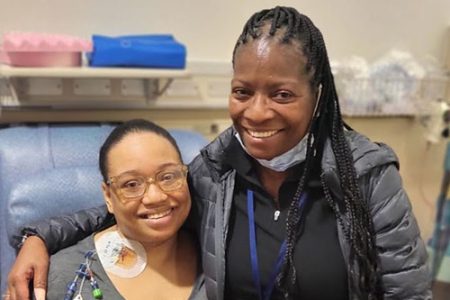Jessica was diagnosed with Sickle Cell Disease just after she was born, before she and her parents left the hospital. At two years old came the first bouts with pain caused by this rare genetic disease. The pain could occur anywhere blood circulates and triggered by any stress including climbing a flight of stairs. The impact of the disease includes deterioration of bones, organ failure and stroke. Long-term use of pain medications lead to additional health problems. Emergency room visits were the norm for Jessica. She had been on life-support on three occasions. Her family was told her life expectancy was under 16 years.
Fast forward and Jessica, now about to turn 30, has defied the odds and looking at a bright future free of Sickle Cell Disease. Jessica was one of a few special patients participating in NHLBI’s initiative where she has received a bone marrow transplant from her mom Phyllis as her donor. The preparation leading up to the transplant was grueling and required a long hospital stay in insolation. Post transplant, daughter and mother are using one of Friends dedicated apartments in downtown Bethesda while receiving follow up care.
This transplant means a new and bright future for Jessica. ‘Officially cured’ of the disease, Jessica’s plans include continuing her education and pursuing a career in medicine. Both mom and daughter are very much looking forward to returning to their home in New York where Jessica’s four siblings are ready to welcome their sister and mother home.
Supporting Patients on their Journey to a Cure
Friends is excited to be supporting patients like Jessica who are participating in clinical trials for a cure for SCD–bone marrow transplants through NHLBI’s “Cure Sickle Cell Initiative” happening at the NIH Clinical Center. (You may have seen a recent article in the New York Times about a gene therapy approach at Children’s National Hospital, Washington, DC.)
Friends support includes housing in two furnished apartments in Bethesda where patients may stay for extended periods while they receive required follow-up care, as well as incidental expenses, and travel for family members.





